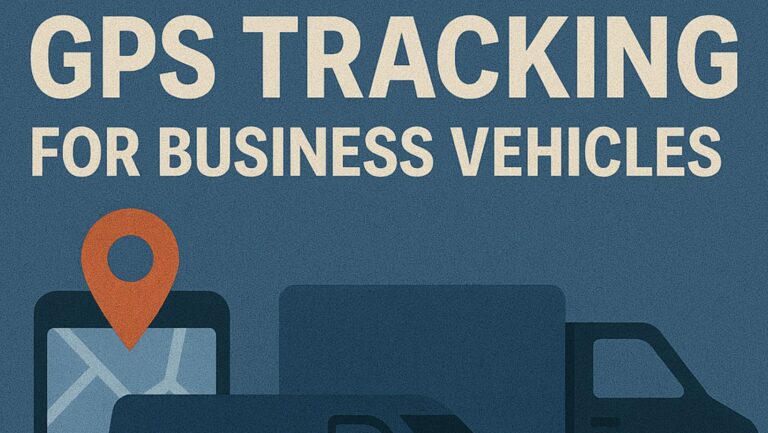Running a business without GPS tracking on your vehicles today is like driving blindfolded, it’s risky, inefficient, and downright costly. Whether you operate a plumbing company with 5 trucks or manage a logistics fleet of 500, GPS vehicle tracking can be your secret weapon for productivity, safety, and growth.
At BrickHouse Security, we’ve helped thousands of businesses take control of their fleets with GPS technology that’s simple to install, easy to use, and packed with value.
Let’s dive into how GPS tracking for business vehicles can improve your operations, reduce expenses, and give you the oversight you didn’t know you were missing.
What is GPS Tracking for Business Vehicles?
GPS tracking for business vehicles involves installing a small, discreet device in each vehicle to monitor location, movement, speed, idling time, and more. These devices transmit real-time data to an online dashboard, helping fleet managers make smarter decisions — whether that means rerouting a delivery driver or investigating unauthorized vehicle use.
Think of it like a digital command center for your mobile workforce.
Why Businesses Are Turning to GPS Vehicle Tracking (And Why You Should Too)
Here’s what the data says:
- 64% of fleet managers reported a reduction in fuel costs after implementing GPS tracking (Source: Verizon Connect).
- 42% saw fewer safety incidents due to improved driver behavior.
- 62% of businesses using GPS trackers reported improved customer service.
- Companies report an average ROI of 10:1 on GPS tracking investments (Source: Fleetio).
Bottom line? Tracking pays for itself, and then some.
Key Benefits of GPS Tracking for Business Vehicles
Let’s break down how GPS tracking can help your bottom line and daily operations:
1. Real-Time Location Tracking
Stay in the loop with live updates on every vehicle. Know where your drivers are, whether they’re stuck in traffic or just pulled into a customer’s driveway.
Use Case: HVAC company reroutes technician to urgent service call nearby, saving time and satisfying a top-tier client.
2. Reduced Fuel Waste
GPS tracking helps you cut fuel costs in multiple ways:
- Reduce idling time
- Eliminate unauthorized vehicle use
- Optimize routes with traffic-aware maps
Did you know: Fleet managers save an average of $20–$60 per vehicle, per month in fuel alone with route optimization.
3. Improved Driver Behavior
Speeding, harsh braking, and hard cornering can all be tracked. With GPS data, you can coach drivers on safe habits, leading to:
- Fewer accidents
- Lower insurance premiums
- Better public image
4. Maintenance Reminders
GPS platforms log mileage and usage, helping you schedule oil changes, tire rotations, and inspections on time, reducing breakdowns and extending vehicle life.
5. Theft Recovery & Asset Protection
If a vehicle is stolen, GPS tracking allows police to recover it quickly.
6. Better Customer Service
Give your customers accurate ETAs, confirm service appointments, and offer better transparency. This builds trust and helps you stand out in competitive industries.
What Industries Benefit Most from GPS Tracking?
While nearly every business that uses vehicles can benefit, here are a few standout examples:
| Industry | How GPS Tracking Helps |
| Construction | Monitor equipment location, reduce theft, and track deliveries |
| Field Services (HVAC, Plumbing) | Dispatch the closest technicians, provide ETAs |
| Delivery Services | Optimize routes, reduce delivery times, and track packages |
| Transportation & Logistics | Monitor driver hours, ensure DOT compliance, manage large fleets |
| Landscaping & Pest Control | Track job site visits, prevent fuel fraud, ensure accountability |
Choosing the Right GPS Tracker for Your Business Vehicles
Not all GPS trackers are created equal. Here’s what to consider:
Real-Time Tracking vs. Passive Tracking
- Real-time: Sends updates every few seconds (best for dispatch-heavy businesses)
- Passive: Stores data locally for later review (lower cost, good for audits)
Hardwired vs. Plug-and-Play
- Hardwired: Installed behind the dashboard, tamper-resistant, ideal for long-term use
- Plug-and-Play (OBD-II): Easy to install, portable between vehicles
Features to Look For:
- Driver behavior alerts
- Route history and replay
- Maintenance scheduling
- Mobile app access
- Geo-fencing alerts
At BrickHouse Security, we personally test every device we sell — if it doesn’t meet our standards, we don’t offer it.
Legal and Privacy Considerations
GPS tracking is legal for business-owned vehicles, especially when used for operational efficiency and asset protection. However, we always recommend:
- Disclosing tracking policies to employees
- Having a signed vehicle usage agreement
- Avoiding use on personal vehicles without consent
Being upfront builds trust with your team — and protects your business legally.
How to Get Started with GPS Tracking for Your Business
Here’s how to roll it out successfully:
Step 1: Identify Your Needs
Are you tracking deliveries? Service routes? Preventing unauthorized use? Understanding your goals will help you pick the right system.
Step 2: Choose the Right Device
Pick from OBD-II plug-ins, hardwired units, or battery-powered devices depending on your fleet.
Step 3: Install and Test
We offer DIY and professional installation. Most devices take under 15 minutes to install.
Step 4: Train Your Team
Show drivers how the system works, and explain the benefits to them too — it’s not about surveillance; it’s about safety and efficiency.
Step 5: Monitor and Adjust
Use your dashboard to spot trends, coach drivers, and tweak routes. You’ll be amazed at the insight you gain in just a few days.
Geo-Targeting Tip: Why GPS Tracking is Especially Valuable in Urban and Suburban Areas
If your business operates in dense urban areas like New York, Los Angeles, or Chicago, traffic, parking, and idle time can eat into your profits fast. GPS tracking helps:
- Avoid congestion
- Monitor idling in no-parking zones
- Reroute around road closures or events
For suburban businesses, tracking helps with route planning, fuel control, and verifying customer stops over longer distances.
The BrickHouse Advantage
At BrickHouse Security, we’ve been helping businesses like yours since 2005, with real-world experience, industry-certified expertise, and U.S.-based support.
Why businesses trust us:
- Bank-grade data encryption
- Top-rated GPS fleet trackers
- U.S.-based, expert customer support
- Real-world tested by me and my team personally
- Used by Fortune 500 companies, government agencies, and small businesses alike
Final Thoughts: GPS Tracking Is No Longer Optional
If you want to stay competitive, protect your assets, and improve your service, GPS tracking for business vehicles is a must. Whether you’re managing two trucks or two hundred, GPS lets you work smarter, not harder.
FAQ: GPS Tracking for Business Vehicles
Is GPS tracking legal for business vehicles?
Yes, if the vehicles are company-owned, you’re within your rights to track them. Just be transparent with employees and include it in your usage policy.
How much does GPS tracking for fleets cost?
Most businesses spend between $15 – $35 per vehicle/month on GPS tracking. But the ROI in fuel, labor, and theft prevention often far outweighs the cost.
Can GPS trackers help with insurance discounts?
Yes. Many insurers offer 5-20% discounts for fleets with verified GPS tracking that promotes safe driving.
What if I have a small fleet?
Even if you have just 2 or 3 vehicles, GPS tracking can help you save money and protect your assets. It’s not just for the big guys.
How long does installation take?
Plug-and-play devices take 5 minutes or less. Hardwired options may require 20–60 minutes per vehicle but offer more security.
Will GPS tracking invade employee privacy?
Not when done right. Focus on business use, disclose tracking policies, and use the data to reward safe driving, not micromanage.




